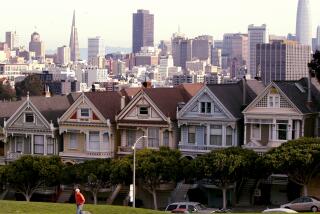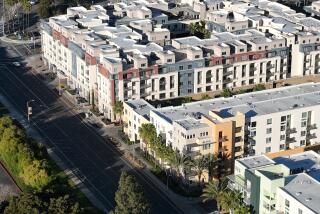Pioneering O.C. Builder John D. Lusk Dead at 91
Premier Orange County home builder John D. Lusk, a development pioneer who founded a $500 million real estate empire, died Sunday at his home in Laguna Beach. He was 91.
Lusk leaves as a legacy the development of a huge swath of post-World War II Southern California. His Irvine-based company, originally John D. Lusk & Son, now Lusk Co., built more than 40,000 homes and scores of shopping centers, office buildings and industrial parks, helping to shape the region.
His career was characterized by a willingness to gamble his fortune on enterprises other builders shied away from. He was among the first to build houses in places like Anaheim Hills and San Clemente that many of his competitors believed were too far away from the region’s business centers to become attractive residential areas.
He used his vast fortune to support a host of charities and educational programs, including the prestigious Lusk Center for Real Estate Development at USC, which began in 1988 with a $4-million grant from the builder.
“He was a real entrepreneur and a real gentleman,” said Alfred Gobar, a Placentia real estate consultant who knew and worked with Lusk for more than 20 years.
Lusk told contemporaries that his parents--his father was a Methodist minister, his mother a teacher and scriptwriter--imbued in him a sensitivity to the plight of the poor and a desire to promote prosperity in the community.
To that end, he supported as many small, low-key efforts as major charities, giving time and money to local YMCAs as well as to City of Hope. He was a founder of Nuestros Pequenos Hermanos, an orphanage in Cuernavaca, Mexico; a trustee of Mead Housing Trust, a nonprofit development organization for low-income housing; and a founding trustee of Whittier Presbyterian Community Hospital.
Lusk, who dropped out of USC in 1925 to pursue a banking career, also valued education. In addition to his work with the Lusk Center, he was a life trustee of Claremont College. He also endowed the Lusk Chair in Planning and Development at USC’s school of urban and regional planning.
His 50-plus years in the building industry came after a 21-year career in banking. Lusk parlayed a $75-a-month bookkeeper’s job at what was then Security Pacific Bank in Los Angeles into a series of assignments that culminated with the vice presidency of the bank’s Beverly Hills office.
As Lusk himself told the story, he moved into real estate in 1946, when his boss--deaf to his arguments that the region’s housing market was about to explode with demand from GIs returning home from World War II battlefields in the Pacific--decided to stop making real estate loans.
Lusk resigned and started a custom home-building company. He was soon spearheading a team of craftsmen who were hammering together estates in Beverly Hills, Brentwood, Bel Air and other posh enclaves in West Los Angeles.
But Lusk had always seen himself providing homes to the Army privates and Navy swabs who fought in the war, not just to the generals who commanded them.
Joined by his son, William--who continues as vice chairman of Lusk Co.--Lusk turned his efforts to more affordable tract housing, first in Westchester, then moving south with the populace into Whittier, Hacienda Heights and La Habra.
By the mid-1960s, he was a leading developer in central and southern Orange County, and the Lusk brand name was sought after by home hunters in planned communities like Spyglass Hill, East Bluff, Harbor View Hills and Turtle Rock on the vast Irvine Ranch.
“He was a giant in the industry,” said Randall Lewis, a vice president of Lewis Homes in Upland. “His reputation for honesty and integrity was impeccable.”
He also was one of the first home builders to see the value of expanding into commercial development to balance the cyclical nature of the housing business.
Lusk Co. ultimately owned more than 4,600 acres of commercial and industrial sites across the Southland, including the $1-billion California Commerce Center near Ontario International Airport.
Randall Lewis’ father, Ralph--founder of Lewis Homes--got his start as a bookkeeper for Lusk. He recalled the lanky builder telling him that the secret to success was to take the profits from the good years of home building and invest them in offices and stores to see the company through the lean times.
Lusk was willing to take risks and was renowned for his great timing, fellow developer Kathryn Thompson said of him in an interview in 1992.
Lusk was honored by his peers on several occasions. He served as president of the Los Angeles chapter of the Building Contractors Assn. and a director of the Home Building Assn. In 1983, the Building Industry Assn. named him Builder of the Year; in 1986, it awarded him its Medal of Honor.
Though Lusk’s family did not disclose the cause of death, Lusk Co. President Jim Johnson said he suffered a heart attack a year ago.
Lusk never fully recovered, Johnson said, but continued to pursue his passion for golf, playing Tuesdays at Los Angeles Country Club and a second round later each week at either Newport Beach Country Club or Big Canyon.
Lusk, who turned daily control of his company over to Johnson in 1992 in a successful effort to turn around a business that had run into trouble in the region’s building industry recession, also continued to come to his office in Irvine every day until a month ago.
Lusk is survived by wife Nancy; sons William and Robert and daughter Kristen; and seven grandchildren.
A memorial service is set for 9:30 a.m. Friday at the Church of the Recessional at Forest Lawn in Glendale.
The family requests that, in lieu of flowers, donations be made in Lusk’s name to Friends of the Orphans, P.O. Box 25507, Tempe, Ariz., 85285.
More to Read
Inside the business of entertainment
The Wide Shot brings you news, analysis and insights on everything from streaming wars to production — and what it all means for the future.
You may occasionally receive promotional content from the Los Angeles Times.










